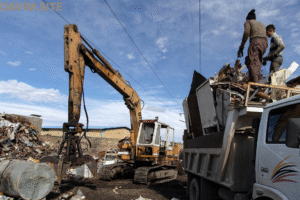
Waste management is increasingly crucial in the environmentally concerned society of today. Globally concerned about environmental problems, the need for qualified waste managers is fast rising. More than simply a salary, waste management occupations provide an opportunity to help public health, sustainability, and the future of our earth.
Everything you need to know about waste management employment—career paths, skill sets, job outlook, and starting points—will be covered in this book. Waste management might be your next major step, whether your goals are job transition, workforce entry, or exploration of a greener future.
What Are Waste Management Jobs?
Waste management jobs refer to roles that involve the collection, transportation, processing, recycling, disposal, or monitoring of waste materials. These jobs are essential for keeping cities clean, reducing pollution, and supporting sustainable development.
Key Sectors in Waste Management
-
Municipal Waste Collection
Workers collect residential and commercial waste and ensure proper disposal. -
Recycling and Material Recovery
Jobs in this sector involve sorting recyclable materials and managing recycling plants. -
Hazardous Waste Disposal
Specialized positions deal with the safe handling and disposal of chemical, industrial, or medical waste. -
Landfill and Compost Operations
These roles involve the operation and maintenance of landfills or compost facilities. -
Waste-to-Energy Plants
Employees convert waste into usable energy, helping to reduce landfill dependency.
Top Waste Management Job Titles
Here are some common job titles in the waste management industry:
| Job Title | Description |
|---|---|
| Sanitation Worker | Collects and disposes of waste from residential and commercial areas. |
| Recycling Technician | Sorts and processes recyclables at facilities. |
| Landfill Operator | Maintains and monitors landfill operations to ensure compliance with safety standards. |
| Environmental Technician | Tests soil, air, and water quality to ensure safe waste practices. |
| Waste Management Engineer | Designs and manages systems for waste treatment and disposal. |
| Hazardous Waste Specialist | Handles the safe transport and treatment of dangerous materials. |
| Route Driver (Garbage Truck Driver) | Operates vehicles to collect waste from specific routes. |
| Composting Coordinator | Manages organic waste programs and composting operations. |
| Facility Manager | Oversees daily operations at waste or recycling plants. |
Why Choose a Career in Waste Management?
1. Job Security
The waste management industry is essential. No matter the economic situation, waste still needs to be handled, giving these jobs a level of stability not always found in other fields.
2. Good Pay and Benefits
Many waste management jobs offer competitive wages, health insurance, retirement plans, and paid time off. For example, in the U.S., garbage truck drivers often earn over $50,000 annually.
3. Diverse Career Opportunities
Whether you’re interested in engineering, logistics, environmental science, or hands-on labor, waste management has roles for various skill sets and education levels.
4. Eco-Impact
Working in waste management allows you to contribute to a cleaner, more sustainable planet. Many roles directly reduce pollution, increase recycling, and promote renewable energy.
Skills and Qualifications for Waste Management Jobs
General Skills Needed
-
Physical stamina (for labor-intensive roles)
-
Attention to safety
-
Teamwork and communication
-
Mechanical aptitude (especially for drivers and operators)
-
Problem-solving abilities
-
Environmental awareness
Educational Requirements
-
Entry-Level Roles: High school diploma or GED often sufficient. On-the-job training provided.
-
Technical Roles: Certifications in hazardous waste handling, recycling, or machinery operation may be required.
-
Professional/Engineering Roles: Bachelor’s degree in Environmental Science, Engineering, or Waste Management.
Certifications That Boost Your Resume
-
OSHA Safety Certification
-
CDL (Commercial Driver’s License)
-
HAZWOPER (Hazardous Waste Operations and Emergency Response)
-
SWANA Certification (Solid Waste Association of North America)
-
Environmental Protection Agency (EPA) Waste Management Programs
Waste Management Job Outlook in 2025 and Beyond
With urbanization, population growth, and increased awareness of environmental issues, the demand for waste management professionals is on the rise.
According to the U.S. Bureau of Labor Statistics, waste collection and recycling jobs are expected to grow steadily, with the fastest demand in:
-
Urban centers
-
Green energy projects
-
Climate-change mitigation efforts
Developing countries are also investing heavily in modern waste infrastructure, making international careers a viable option.
How to Find Waste Management Jobs
1. Online Job Boards
Popular platforms like Indeed, Glassdoor, and LinkedIn list thousands of waste management jobs, from entry-level to executive roles.
Keywords to search:
-
Waste management technician
-
Recycling plant jobs
-
Sanitation worker openings
-
Environmental waste jobs
-
Landfill operations jobs
2. Company Websites
Major employers like Waste Management Inc., Republic Services, Veolia, and Clean Harbors frequently post jobs on their websites.
3. Government and Municipal Listings
City and state government websites often list public sector waste management positions with excellent benefits.
4. Industry-Specific Job Sites
-
SWANA Jobs Board
-
EnvironmentalCareer.com
-
GreenJobs.net
Resume Tips for Waste Management Jobs
-
Highlight Safety Certifications: Employers prioritize safety-conscious applicants.
-
Include Physical Capabilities: Especially for labor roles, show your ability to lift, bend, or operate machinery.
-
Mention Green or Eco-Focused Work: Recycling efforts, environmental projects, etc.
-
Quantify Impact: E.g., “Helped divert 10 tons of waste from landfill annually through optimized recycling routes.”
Interview Questions to Prepare For
-
What do you know about proper waste disposal practices?
-
How do you handle hazardous materials?
-
Describe a time you worked as part of a team.
-
What steps do you take to ensure safety on the job?
-
How would you handle a customer who is upset about missed waste pickup?
Career Growth in Waste Management
While some roles are entry-level, waste management offers clear advancement opportunities:
-
From Laborer → Supervisor → Operations Manager
-
From Driver → Route Manager → Fleet Manager
-
From Technician → Environmental Specialist → Compliance Director
Many companies offer tuition reimbursement, internal promotions, and training programs to help you advance your career.
Sustainability and the Future of Waste Jobs
The waste management sector is becoming more tech-driven and sustainable. Jobs are evolving with trends like:
-
Smart Waste Bins with sensors and route optimization
-
AI in Recycling Plants to sort materials faster
-
Circular Economy Roles focused on reuse and material recovery
-
Waste-to-Energy Jobs transforming trash into electricity
This means new types of jobs are being created, blending technology, sustainability, and operations.

Conclusion: Waste Management Jobs Are the Future
Waste management can be the ideal sector if you’re seeking a career with direction, stability, and chances for personal development. This industry never sleeps; it promotes environmental ideals, and it honors diligent people at all levels.
Waste management experts are the hidden heroes of sustainability, from the streets of your community to sophisticated sorting facilities.
Now is a fantastic moment to investigate waste management positions regardless of your level of experience or prospective career change.